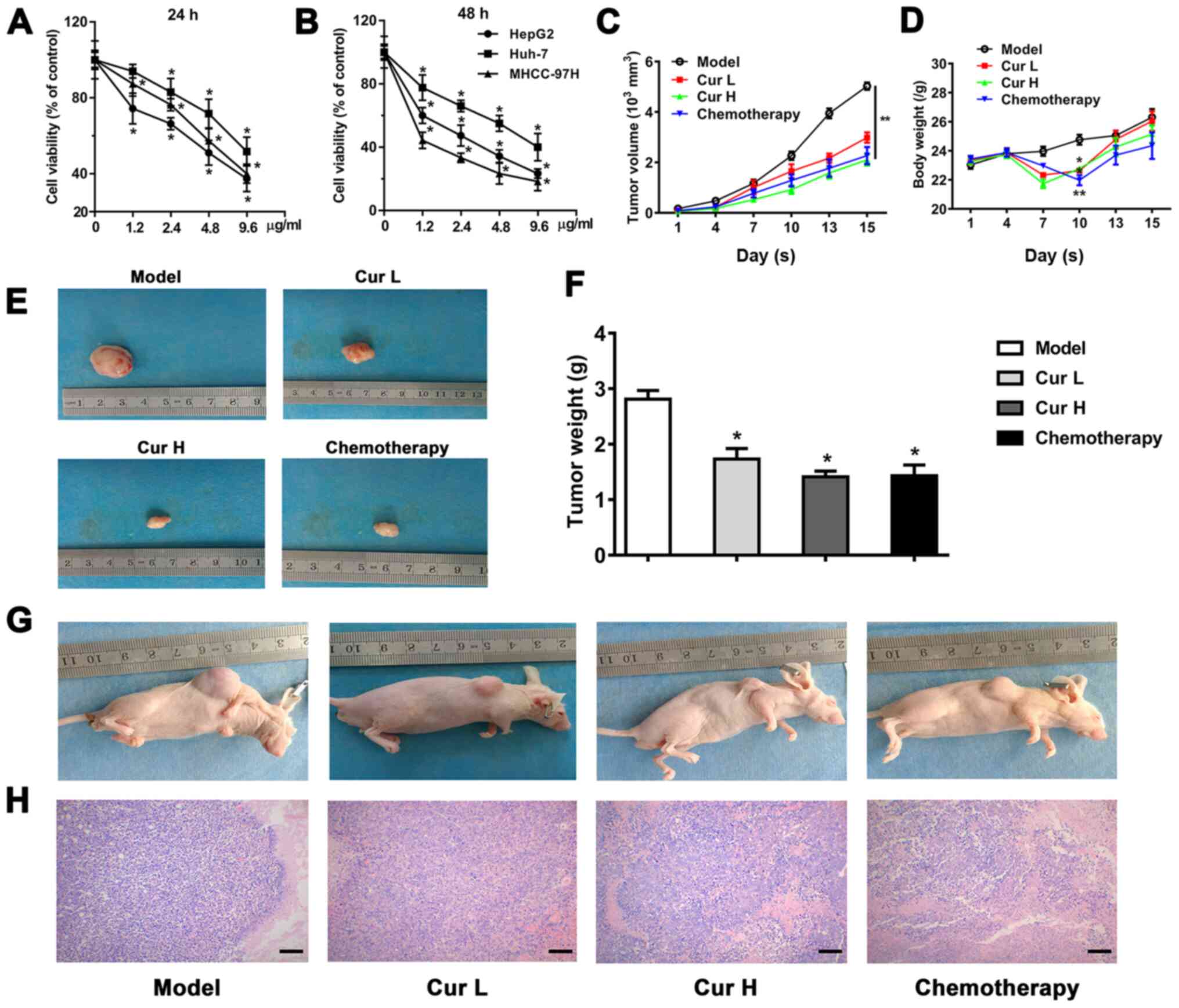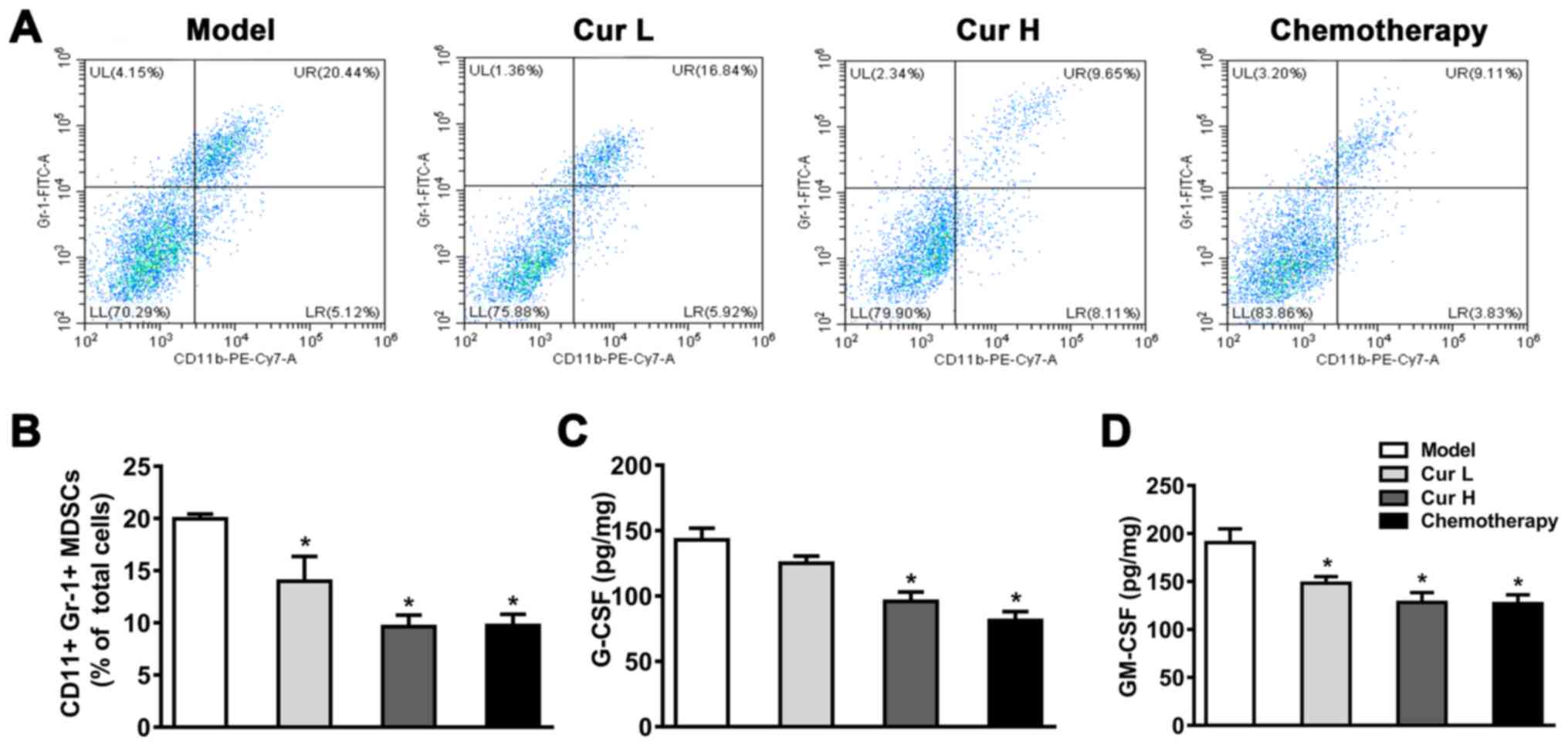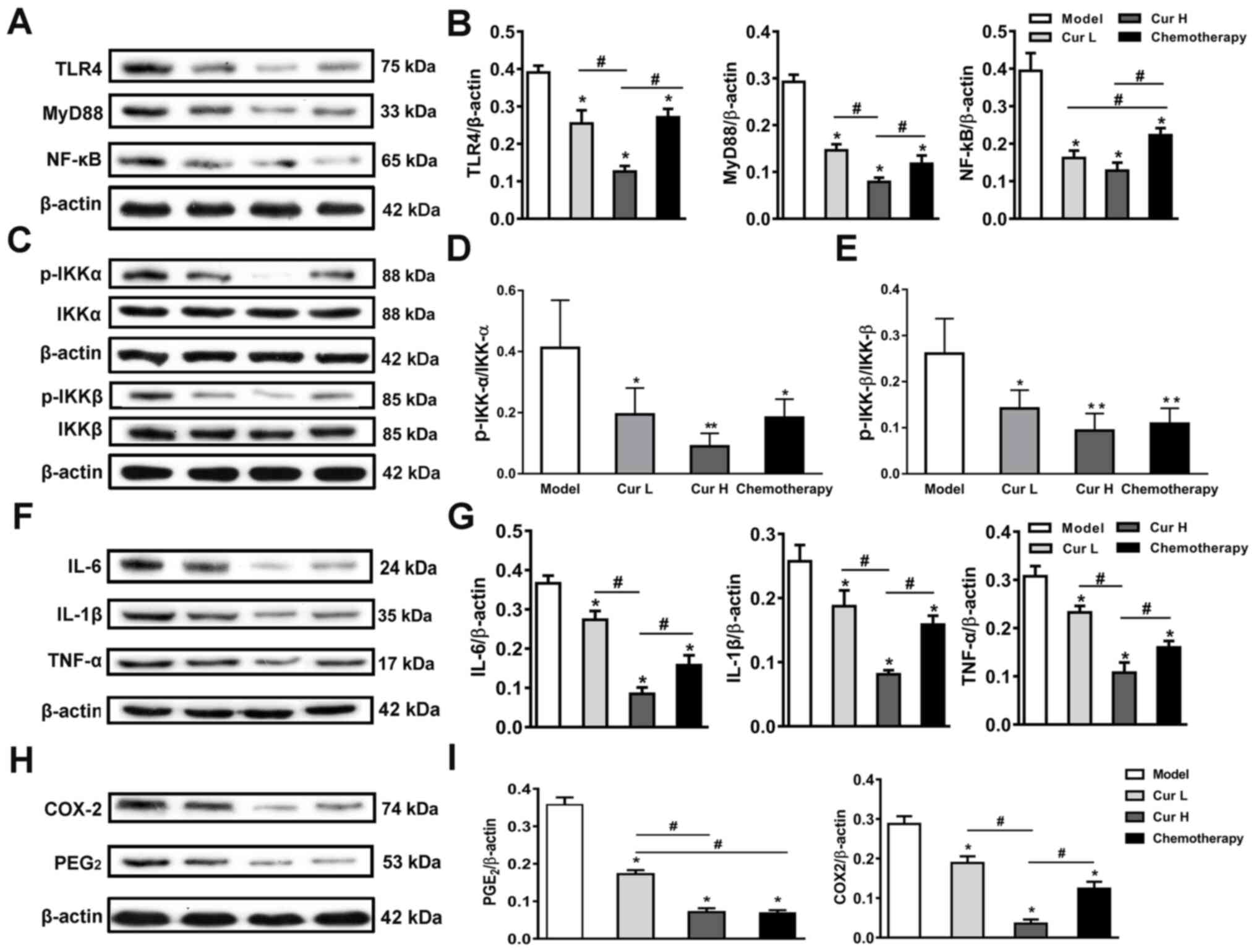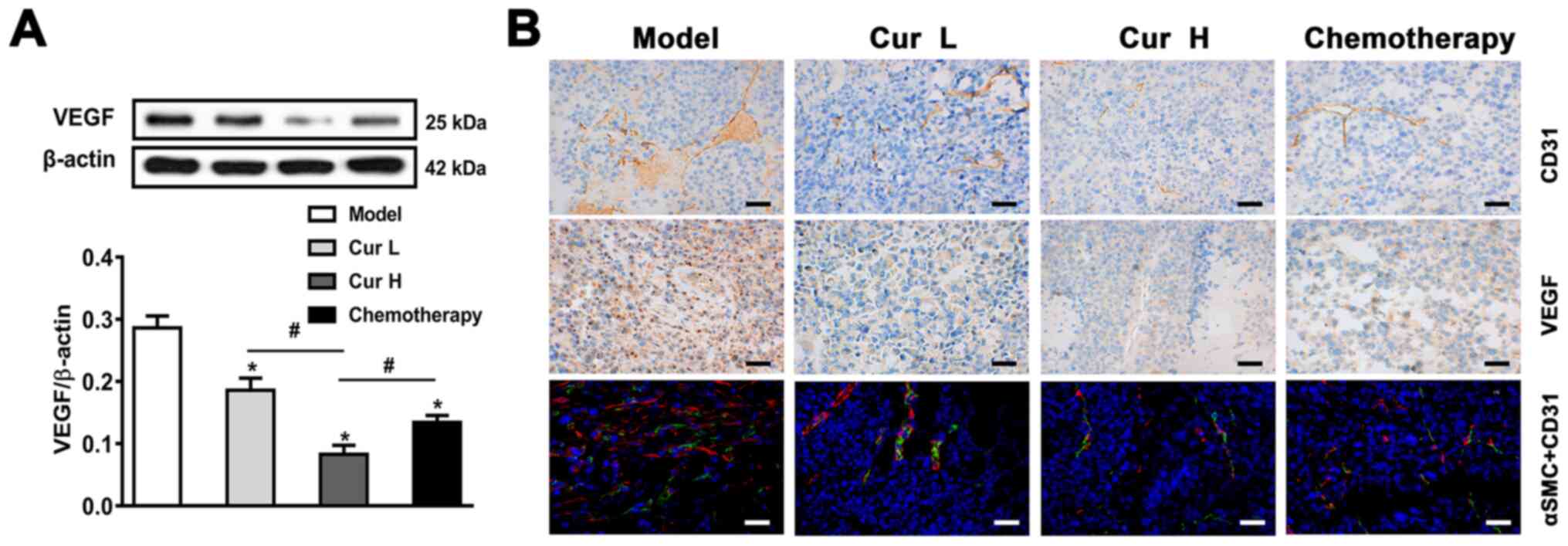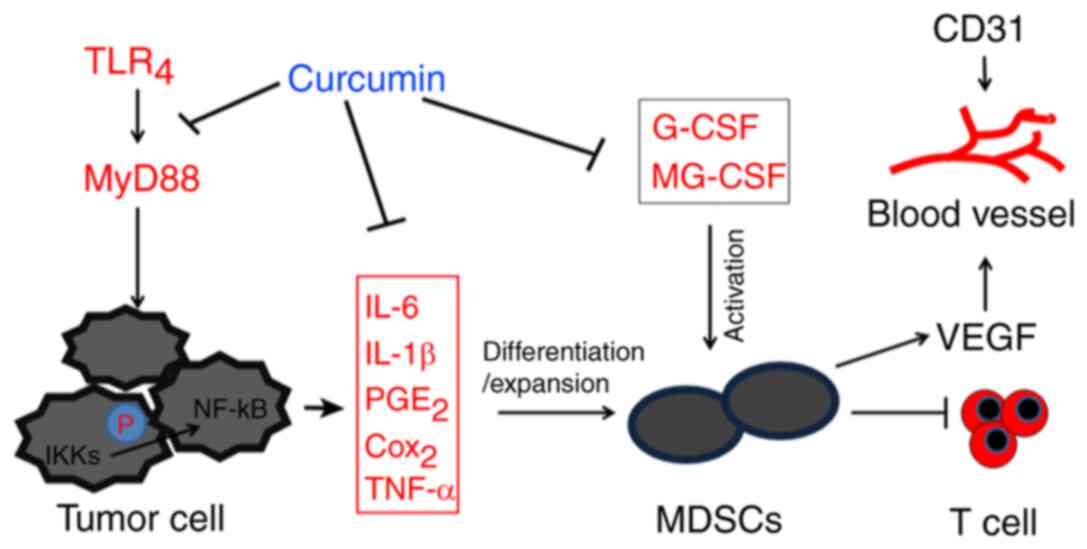|
1
|
Galon J, Costes A, Sanchez-Cabo F,
Kirilovsky A, Mlecnik B, Lagorce-Pagès C, Tosolini M, Camus M,
Berger A, Wind P, et al: Type, density, and location of immune
cells within human colorectal tumors predict clinical outcome.
Science. 313:1960–1964. 2006. View Article : Google Scholar : PubMed/NCBI
|
|
2
|
Condeelis J and Pollard JW: Macrophages:
Obligate partners for tumor cell migration, invasion, and
metastasis. Cell. 124:263–266. 2006. View Article : Google Scholar : PubMed/NCBI
|
|
3
|
Movahedi K, Guilliams M, Van den Bossche
J, Van den Bergh R, Gysemans C, Beschin A, De Baetselier P and Van
Ginderachter JA: Identification of discrete tumor-induced
myeloid-derived suppressor cell subpopulations with distinct T
cell-suppressive activity. Blood. 111:4233–4244. 2008. View Article : Google Scholar : PubMed/NCBI
|
|
4
|
De Sanctis F, Solito S, Ugel S, Molon B,
Bronte V and Marigo I: MDSCs in cancer: Conceiving new prognostic
and therapeutic targets. Biochim Biophys Acta. 1865:35–48.
2016.PubMed/NCBI
|
|
5
|
Watson GA, Fu YX and Lopez DM: Splenic
macrophages from tumor-bearing mice co-expressing MAC-1 and MAC-2
antigens exert immunoregulatory functions via two distinct
mechanisms. J Leukoc Biol. 49:126–138. 1991. View Article : Google Scholar : PubMed/NCBI
|
|
6
|
Kidiyoor A, Schettini J, Besmer DM, Rego
SL, Nath S, Curry JM, Roy LD, Dréau D and Mukherjee P: Pancreatic
cancer cells isolated from Muc1-null tumors favor the generation of
a mature less suppressive MDSC population. Front Immunol. 5:672014.
View Article : Google Scholar : PubMed/NCBI
|
|
7
|
Gutschalk CM, Yanamandra AK, Linde N,
Meides A, Depner S and Mueller MM: GM-CSF enhances tumor invasion
by elevated MMP-2, −9, and −26 expression. Cancer Med. 2:117–129.
2013. View
Article : Google Scholar : PubMed/NCBI
|
|
8
|
Kowanetz M, Wu X, Lee J, Tan M, Hagenbeek
T, Qu X, Yu L, Ross J, Korsisaari N, Cao T, et al:
Granulocyte-colony stimulating factor promotes lung metastasis
through mobilization of Ly6G+Ly6C+ granulocytes. Proc Natl Acad Sci
USA. 107:21248–21255. 2010. View Article : Google Scholar : PubMed/NCBI
|
|
9
|
Quail DF, Olson OC, Bhardwaj P, Walsh LA,
Akkari L, Quick ML, Chen IC, Wendel N, Ben-Chetrit N, Walker J, et
al: Obesity alters the lung myeloid cell landscape to enhance
breast cancer metastasis through IL5 and GM-CSF. Nat Cell Biol.
19:974–987. 2017. View
Article : Google Scholar : PubMed/NCBI
|
|
10
|
Serafini P, Carbley R, Noonan KA, Tan G,
Bronte V and Borrello I: High-dose granulocyte-macrophage
colony-stimulating factor-producing vaccines impair the immune
response through the recruitment of myeloid suppressor cells.
Cancer Res. 64:6337–6343. 2004. View Article : Google Scholar : PubMed/NCBI
|
|
11
|
Dolcetti L, Peranzoni E, Ugel S, Marigo I,
Fernandez Gomez A, Mesa C, Geilich M, Winkels G, Traggiai E, Casati
A, et al: Hierarchy of immunosuppressive strength among
myeloid-derived suppressor cell subsets is determined by GM-CSF.
Eur J Immunol. 40:22–35. 2010. View Article : Google Scholar : PubMed/NCBI
|
|
12
|
Yao D, Dong M, Dai C and Wu S:
Inflammation and inflammatory cytokine contribute to the initiation
and development of ulcerative colitis and its associated cancer.
Inflamm Bowel Dis. 25:1595–1602. 2019. View Article : Google Scholar : PubMed/NCBI
|
|
13
|
Xu J, Pei S, Wang Y, Liu J, Qian Y, Huang
M, Zhang Y and Xiao Y: Tpl2 protects against fulminant hepatitis
through mobilization of myeloid-derived suppressor cells. Front
Immunol. 10:19802019. View Article : Google Scholar : PubMed/NCBI
|
|
14
|
Li ZW, Sun B, Gong T, Guo S, Zhang J, Wang
J, Sugawara A, Jiang M, Yan J, Gurary A, et al: GNAI1 and GNAI3
reduce colitis-associated tumorigenesis in mice by blocking il6
signaling and down-regulating expression of GNAI2.
Gastroenterology. 156:2297–2312. 2019. View Article : Google Scholar : PubMed/NCBI
|
|
15
|
Tariq M, Zhang J, Liang G, Ding L, He Q
and Yang B: Macrophage polarization: Anti-cancer strategies to
target tumor-associated macrophage in breast cancer. J Cell
Biochem. 118:2484–2501. 2017. View Article : Google Scholar : PubMed/NCBI
|
|
16
|
Musolino C, Allegra A, Pioggia G and
Gangemi S: Immature myeloid-derived suppressor cells: A bridge
between inflammation and cancer (Review). Oncol Rep. 37:671–683.
2017. View Article : Google Scholar : PubMed/NCBI
|
|
17
|
Perfilyeva YV, Abdolla N, Ostapchuk YO,
Tleulieva R, Krasnoshtanov VC, Perfilyeva AV and Belyaev NN:
Chronic inflammation contributes to tumor growth: Possible role of
l-selectin-expressing myeloid-derived suppressor cells (MDSCs).
Inflammation. 42:276–289. 2019. View Article : Google Scholar : PubMed/NCBI
|
|
18
|
Guven Maiorov E, Keskin O, Gursoy A and
Nussinov R: The structural network of inflammation and cancer:
Merits and challenges. Semin Cancer Biol. 23:243–251. 2013.
View Article : Google Scholar : PubMed/NCBI
|
|
19
|
Wang L, Niu Z, Wang X, Li Z, Liu Y, Luo F
and Yan X: PHD2 exerts anti-cancer and anti-inflammatory effects in
colon cancer xenografts mice via attenuating NF-κB activity. Life
Sci. 242:1171672020. View Article : Google Scholar : PubMed/NCBI
|
|
20
|
Banerjee S, Ji C, Mayfield JE, Goel A,
Xiao J, Dixon JE and Guo X: Ancient drug curcumin impedes 26S
proteasome activity by direct inhibition of dual-specificity
tyrosine-regulated kinase 2. Proc Natl Acad Sci USA. 115:8155–8160.
2018. View Article : Google Scholar : PubMed/NCBI
|
|
21
|
Liu Y, Wang X, Zeng S, Zhang X, Zhao J,
Zhang X, Chen X, Yang W, Yang Y, Dong Z, et al: The natural
polyphenol curcumin induces apoptosis by suppressing STAT3
signaling in esophageal squamous cell carcinoma. J Exp Clin Cancer
Res. 37:3032018. View Article : Google Scholar : PubMed/NCBI
|
|
22
|
Zhang P, Lai ZL, Chen HF, Zhang M, Wang A,
Jia T, Sun WQ, Zhu XM, Chen XF, Zhao Z and Zhang J: Curcumin
synergizes with 5-fluorouracil by impairing AMPK/ULK1-dependent
autophagy, AKT activity and enhancing apoptosis in colon cancer
cells with tumor growth inhibition in xenograft mice. J Exp Clin
Cancer Res. 36:1902017. View Article : Google Scholar : PubMed/NCBI
|
|
23
|
Wang L, Chen X, Du Z, Li G, Chen M, Chen
X, Liang G and Chen T: Curcumin suppresses gastric tumor cell
growth via ROS-mediated DNA polymerase γ depletion disrupting
cellular bioenergetics. J Exp Clin Cancer Res. 36:472017.
View Article : Google Scholar : PubMed/NCBI
|
|
24
|
Rana M, Maurya P, Reddy SS, Singh V, Ahmad
H, Dwivedi AK, Dikshit M and Barthwal MK: A standardized chemically
modified Curcuma longa extract modulates IRAK-MAPK signaling
in inflammation and potentiates cytotoxicity. Front Pharmacol.
7:2232016. View Article : Google Scholar : PubMed/NCBI
|
|
25
|
Uchio R, Higashi Y, Kohama Y, Kawasaki K,
Hirao T, Muroyama K and Murosaki S: A hot water extract of turmeric
(Curcuma longa) suppresses acute ethanol-induced liver
injury in mice by inhibiting hepatic oxidative stress and
inflammatory cytokine production. J Nutr Sci. 6:e32017. View Article : Google Scholar : PubMed/NCBI
|
|
26
|
Farajzadeh R, Zarghami N, Serati-Nouri H,
Momeni-Javid Z, Farajzadeh T, Jalilzadeh-Tabrizi S, Sadeghi-Soureh
S, Naseri N and Pilehvar-Soltanahmadi Y: Macrophage repolarization
using CD44-targeting hyaluronic acid-polylactide nanoparticles
containing curcumin. Artif Cells Nanomed Biotechnol. 46:2013–2021.
2018.PubMed/NCBI
|
|
27
|
Illuri R, Bethapudi B, Anandakumar S,
Murugan S, Joseph JA, Mundkinajeddu D, Agarwal A and Chandrasekaran
CV: Anti-Inflammatory activity of polysaccharide fraction of
Curcuma longa extract (NR-INF-02). Antiinflamm Antiallergy
Agents Med Chem. 14:53–62. 2015. View Article : Google Scholar : PubMed/NCBI
|
|
28
|
Kocaadam B and Şanlier N: Curcumin, an
active component of turmeric (Curcuma longa), and its
effects on health. Crit Rev Food Sci Nutr. 57:2889–2895. 2017.
View Article : Google Scholar : PubMed/NCBI
|
|
29
|
Pulido-Moran M, Moreno-Fernandez J,
Ramirez-Tortosa C and Ramirez-Tortosa M: Curcumin and health.
Molecules. 21:2642016. View Article : Google Scholar : PubMed/NCBI
|
|
30
|
Darvesh AS, Aggarwal BB and Bishayee A:
Curcumin and liver cancer: A review. Curr Pharm Biotechnol.
13:218–228. 2012. View Article : Google Scholar : PubMed/NCBI
|
|
31
|
National Research Council, . Guide for the
Care and Use of Laboratory Animals. The National Academies Press;
Washington DC, USA: eighth edition. pp. 11–154. 2011
|
|
32
|
Kolligs FT, Hoffmann RT, op den Winkel M,
Bruns CJ, Herrmann K, Jakobs TF, Lamerz R, Trumm C, Zech CJ,
Wilkowski R and Graeb C: Diagnosis and multimodal therapy for
hepatocellular carcinoma. Z Gastroenterol. 48:274–288. 2010.(In
German). View Article : Google Scholar : PubMed/NCBI
|
|
33
|
Hu P, Ke C, Guo X, Ren P, Tong Y, Luo S,
He Y, Wei Z, Cheng B, Li R, et al: Both glypican-3/Wnt/β-catenin
signaling pathway and autophagy contributed to the inhibitory
effect of curcumin on hepatocellular carcinoma. Dig Liver Dis.
51:120–126. 2019. View Article : Google Scholar : PubMed/NCBI
|
|
34
|
Anand P, Kunnumakkara AB, Newman RA and
Aggarwal BB: Bioavailability of curcumin: Problems and promises.
Mol Pharm. 4:807–818. 2007. View Article : Google Scholar : PubMed/NCBI
|
|
35
|
Karova K, Wainwright JV, Machova-Urdzikova
L, Pisal RV, Schmidt M, Jendelova P and Jhanwar-Uniyal M:
Transplantation of neural precursors generated from spinal
progenitor cells reduces inflammation in spinal cord injury via
NF-κB pathway inhibition. J Neuroinflammation. 16:122019.
View Article : Google Scholar : PubMed/NCBI
|
|
36
|
Gabrilovich DI: Myeloid-derived suppressor
cells. Cancer Immunol Res. 5:3–8. 2017. View Article : Google Scholar : PubMed/NCBI
|
|
37
|
Rafa H, Benkhelifa S, AitYounes S, Saoula
H, Belhadef S, Belkhelfa M, Boukercha A, Toumi R, Soufli I, Moralès
O, et al: All-Trans retinoic acid modulates TLR4/NF-κB signaling
pathway targeting TNF-α and nitric oxide synthase 2 expression in
colonic mucosa during ulcerative colitis and colitis associated
cancer. Mediators Inflamm. 2017:73532522017. View Article : Google Scholar : PubMed/NCBI
|
|
38
|
Cheng R, Billet S, Liu C, Haldar S,
Choudhury D, Tripathi M, Hav M, Merchant A, Hu T, Huang H, et al:
Periodontal inflammation recruits distant metastatic breast cancer
cells by increasing myeloid-derived suppressor cells. Oncogene.
39:1543–1556. 2020. View Article : Google Scholar : PubMed/NCBI
|
|
39
|
Ching MM, Reader J and Fulton AM:
Eicosanoids in cancer: Prostaglandin E(2) receptor 4 in cancer
therapeutics and immunotherapy. Front Pharmacol. 11:8192020.
View Article : Google Scholar : PubMed/NCBI
|
|
40
|
Liu Q, Yuan JW, Zhang F, Qiao F, Sui XF
and Liu CH: Curcumin protects rat H9C2 cardiomyocytes against
doxorubicin toxicity by modulating oxidative stress and apoptosis.
J Biol Regul Homeost Agents. 33:1849–1854. 2019.PubMed/NCBI
|
|
41
|
Flores-Pérez JA, de la Rosa Oliva F,
Argenes Y and Meneses-Garcia A: Nutrition, cancer and personalized
medicine. Adv Exp Med Biol. 1168:157–168. 2019. View Article : Google Scholar : PubMed/NCBI
|
|
42
|
Willenbacher E, Khan SZ, Mujica SCA,
Trapani D, Hussain S, Wolf D, Willenbacher W, Spizzo G and Seeber
A: Curcumin: New insights into an ancient ingredient against
cancer. Int J Mol Sci. 20:18082019. View Article : Google Scholar
|
|
43
|
Kong ZL, Kuo HP, Johnson A, Wu LC and
Chang KLB: Curcumin-loaded mesoporous silica nanoparticles markedly
enhanced cytotoxicity in hepatocellular carcinoma cells. Int J Mol
Sci. 20:29182019. View Article : Google Scholar
|
|
44
|
Wang L, Zhu Z, Han L, Zhao L, Weng J, Yang
H, Wu S, Chen K, Wu L and Chen T: A curcumin derivative, WZ35,
suppresses hepatocellular cancer cell growth via downregulating
YAP-mediated autophagy. Food Funct. 10:3748–3757. 2019. View Article : Google Scholar : PubMed/NCBI
|
|
45
|
Shao S, Duan W, Xu Q, Li X, Han L, Li W,
Zhang D, Wang Z and Lei J: Curcumin suppresses hepatic stellate
cell-induced hepatocarcinoma angiogenesis and invasion through
downregulating CTGF. Oxid Med Cell Longev. 2019:81485102019.
View Article : Google Scholar : PubMed/NCBI
|
|
46
|
Tang D, Zhang S, Shi X, Wu J, Yin G, Tan
X, Liu F, Wu X and Du X: Combination of astragali polysaccharide
and curcumin improves the morphological structure of tumor vessels
and induces tumor vascular normalization to inhibit the growth of
hepatocellular carcinoma. Integr Cancer Ther.
18:15347354188244082019. View Article : Google Scholar : PubMed/NCBI
|
|
47
|
Shao Y, Zhu W, Da J, Xu M, Wang Y, Zhou J
and Wang Z: Bisdemethoxycurcumin in combination with α-PD-L1
antibody boosts immune response against bladder cancer. Onco
Targets Ther. 10:2675–2683. 2017. View Article : Google Scholar : PubMed/NCBI
|
|
48
|
Tu SP, Jin H, Shi JD, Zhu LM, Suo Y, Lu G,
Liu A, Wang TC and Yang CS: Curcumin induces the differentiation of
myeloid-derived suppressor cells and inhibits their interaction
with cancer cells and related tumor growth. Cancer Prev Res
(Phila). 5:205–215. 2012. View Article : Google Scholar : PubMed/NCBI
|
|
49
|
Keren L, Bosse M, Marquez D, Angoshtari R,
Jain S, Varma S, Yang SR, Kurian A, Van Valen D, West R, et al: A
structured tumor-immune microenvironment in triple negative breast
cancer revealed by multiplexed ion beam imaging. Cell.
174:1373–1387. 2018. View Article : Google Scholar : PubMed/NCBI
|
|
50
|
Lazăr DC, Avram MF, Romoșan I, Cornianu M,
Tăban S and Goldiș A: Prognostic significance of tumor immune
microenvironment and immunotherapy: Novel insights and future
perspectives in gastric cancer. World J Gastroenterol.
24:3583–3616. 2018. View Article : Google Scholar : PubMed/NCBI
|
|
51
|
Salminen A: Activation of
immunosuppressive network in the aging process. Ageing Res Rev.
57:1009982020. View Article : Google Scholar : PubMed/NCBI
|
|
52
|
Liu D, You M, Xu Y, Li F, Zhang D, Li X
and Hou Y: Inhibition of curcumin on myeloid-derived suppressor
cells is requisite for controlling lung cancer. Int
Immunopharmacol. 39:265–272. 2016. View Article : Google Scholar : PubMed/NCBI
|
|
53
|
Li YD, Lamano JB, Lamano JB, Quaggin-Smith
J, Veliceasa D, Kaur G, Biyashev D, Unruh D and Bloch O:
Tumor-induced peripheral immunosuppression promotes brain
metastasis in patients with non-small cell lung cancer. Cancer
Immunol Immunother. 68:1501–1513. 2019. View Article : Google Scholar : PubMed/NCBI
|
|
54
|
Hutchison S, Sahay B, de Mello SC, Sayour
EJ, Lejeune A, Szivek A, Livaccari AM, Fox-Alvarez S, Salute M,
Powers L and Milner RJ: Characterization of myeloid-derived
suppressor cells and cytokines GM-CSF, IL-10 and MCP-1 in dogs with
malignant melanoma receiving a GD3-based immunotherapy. Vet Immunol
Immunopathol. 216:1099122019. View Article : Google Scholar : PubMed/NCBI
|
|
55
|
Xu Y, Fang F, Jiao H, Zheng X, Huang L, Yi
X and Zhao W: Activated hepatic stellate cells regulate MDSC
migration through the SDF-1/CXCR4 axis in an orthotopic mouse model
of hepatocellular carcinoma. Cancer Immunol Immunother.
68:1959–1969. 2019. View Article : Google Scholar : PubMed/NCBI
|
|
56
|
Al Sayed MF, Amrein MA, Bührer ED,
Huguenin AL, Radpour R, Riether C and Ochsenbein AF:
T-cell-secreted TNFα induces emergency myelopoiesis and
myeloid-derived suppressor cell differentiation in cancer. Cancer
Res. 79:346–359. 2019. View Article : Google Scholar
|
|
57
|
Yoshimura T, Nakamura K, Li C, Fujisawa M,
Shiina T, Imamura M, Li T, Mukaida N and Matsukawa A: Cancer
cell-derived granulocyte-macrophage colony-stimulating factor is
dispensable for the progression of 4t1 murine breast cancer. Int J
Mol Sci. 20:63242019. View Article : Google Scholar
|
|
58
|
Chen L, Huang CF, Li YC, Deng WW, Mao L,
Wu L, Zhang WF, Zhang L and Sun ZJ: Blockage of the NLRP3
inflammasome by MCC950 improves anti-tumor immune responses in head
and neck squamous cell carcinoma. Cell Mol Life Sci. 75:2045–2058.
2018. View Article : Google Scholar : PubMed/NCBI
|
|
59
|
Bronte V, Brandau S, Chen SH, Colombo MP,
Frey AB, Greten TF, Mandruzzato S, Murray PJ, Ochoa A,
Ostrand-Rosenberg S, et al: Recommendations for myeloid-derived
suppressor cell nomenclature and characterization standards. Nat
Commun. 7:121502016. View Article : Google Scholar : PubMed/NCBI
|
|
60
|
Lei R, Li J, Liu F, Li W, Zhang S, Wang Y,
Chu X and Xu J: HIF-1α promotes the keloid development through the
activation of TGF-β/Smad and TLR4/MyD88/NF-κB pathways. Cell Cycle.
18:3239–3250. 2019. View Article : Google Scholar : PubMed/NCBI
|
|
61
|
Tachibana M: The immunosuppressive
function of myeloid-derived suppressor cells is regulated by the
HMGB1-TLR4 axis. Yakugaku Zasshi. 138:143–148. 2018.(In Japanese).
View Article : Google Scholar : PubMed/NCBI
|
|
62
|
Ren B, Luo S, Tian X, Jiang Z, Zou G, Xu
F, Yin T, Huang Y and Liu J: Curcumin inhibits liver cancer by
inhibiting DAMP molecule HSP70 and TLR4 signaling. Oncol Rep.
40:895–901. 2018.PubMed/NCBI
|
|
63
|
Cassino TR, Drowley L, Okada M, Beckman
SA, Keller B, Tobita K, Leduc PR and Huard J: Mechanical loading of
stem cells for improvement of transplantation outcome in a model of
acute myocardial infarction: The role of loading history. Tissue
Eng Part A. 18:1101–1108. 2012. View Article : Google Scholar : PubMed/NCBI
|
|
64
|
Tawara K, Scott H, Emathinger J, Ide A,
Fox R, Greiner D, LaJoie D, Hedeen D, Nandakumar M, Oler AJ, et al:
Co-expression of VEGF and IL-6 family cytokines is associated with
decreased survival in HER2 negative breast cancer patients:
Subtype-specific IL-6 family cytokine-mediated VEGF secretion.
Transl Oncol. 12:245–255. 2019. View Article : Google Scholar : PubMed/NCBI
|
|
65
|
Pan Z, Zhuang J, Ji C, Cai Z, Liao W and
Huang Z: Curcumin inhibits hepatocellular carcinoma growth by
targeting VEGF expression. Oncol Lett. 15:4821–4826.
2018.PubMed/NCBI
|
|
66
|
Forner A, Reig M and Bruix J:
Hepatocellular carcinoma. Lancet. 391:1301–1314. 2018. View Article : Google Scholar : PubMed/NCBI
|
|
67
|
Ma Z, Wang N, He H and Tang X:
Pharmaceutical strategies of improving oral systemic
bioavailability of curcumin for clinical application. J Control
Release. 316:359–380. 2019. View Article : Google Scholar : PubMed/NCBI
|
|
68
|
Liu W, Zhai Y, Heng X, Che FY, Chen W, Sun
D and Zhai G: Oral bioavailability of curcumin: Problems and
advancements. J Drug Target. 24:694–702. 2016. View Article : Google Scholar : PubMed/NCBI
|
|
69
|
Salehi M, Movahedpour A, Tayarani A,
Shabaninejad Z, Pourhanifeh MH, Mortezapour E, Nickdasti A,
Mottaghi R, Davoodabadi A, Khan H, et al: Therapeutic potentials of
curcumin in the treatment of non-small-cell lung carcinoma.
Phytother Res. 34:2557–2576. 2020. View Article : Google Scholar : PubMed/NCBI
|















